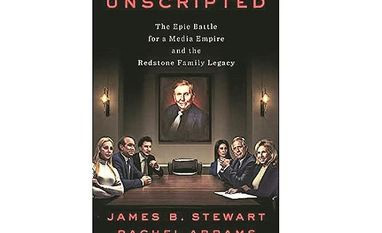UNSCRIPTED: The Epic Battle for a Media Empire and the Redstone Family Legacy
Author: James B Stewart & Rachel Abrams
Publisher: Penguin Press
This book is a model of how gracefully to tell the most grotesque of stories: That of the final years of Sumner Redstone. A self-made business titan, the founder of Paramount Global, whose holdings included Viacom and CBS, Redstone spent his 90s obsessively manipulating the people around him as they sought to manipulate him. The authors, The New York Times journalists James B Stewart and Rachel Abrams, allow us to observe him from an almost uncomfortably intimate distance. The writing is elegant and the story so weird and compelling that the reader may be the only witness to this spectacle who never feels manipulated. It is hard, though, to imagine anyone who reads this book not coming to some clear conclusions: Wealth and power can metastasise until they become toxic, destroying families, companies and countless lives.
Stewart is a business reporter, but the book doesn’t start with business. Its initial sections cover the last years of what must be one of the country’s most dysfunctional families. We meet Redstone in his 90s, while he still displays remnants of his once quick wit and ability to get people to do his bidding. Even then, he has the maturity of an impulsive 13-year-old: Obsessed with sex, or at least with trying to get others to imagine he is having a lot of it.
His pattern is predictable: He identifies a woman who is the better part of a century his junior, then he uses his vast wealth to take over her life. He casually spends millions buying homes and cars for her, and demands that executives at the media platforms he owns (eg MTV) create shows that feature her talents, even if they are middling. He promises women he barely knows that they will inherit his fortune; sometimes, he puts them in his will before angrily removing them and replacing them with his next paramour.
We see in precise detail the misogyny of Redstone’s lust as he decides that his wealth and professed love for these women give him something like the rights of a king. Inevitably, though, he determines that each has betrayed him in some terrible way and, one by one, he cuts them off. (Fortunately for the authors, many of these relationships ended in lawsuits, so there is a detailed record they can call upon to illustrate the pattern.)
Eventually, in one of the episodes graphically documented in court records, Redstone’s unchecked urges lead him to become the victim of his most careful students: Two ex-girlfriends, Sydney Holland and Manuela Herzer who steal from his own playbook to use money, influence and aggressive lawyers to shut him up in his room while depleting his bank accounts. He is trapped in his bedroom in a wheelchair, unable to speak, cut off from the few people who, somehow, still care for him.
Stewart and Abrams set the emotional stage with this seamy domestic drama before turning to one of the most spectacular business debacles of our age: The years-long collapse of Viacom and the misrule at CBS, two large public companies owned by Redstone until his death in 2020. (They were once a single company, then two, then one again, under the name Paramount — largely as a result of Redstone’s fickle whims.)
Redstone controlled 80 per cent of the voting stock of both Viacom and CBS and often used the same mix of declarations of undying support and casual abuse to keep the boards and senior leaders in line. His two chief executives — Leslie Moonves at CBS and, even more so, Philippe Dauman at Viacom — know that their success will come more from flattering the boss than from their company’s performance. None of the major corporate decisions — such as whether CBS and Viacom should merge — were made with an eagle-eyed focus on the best choices for the companies and their shareholders. These decisions were made by hollow men seeking to curry the increasingly erratic favours of their patron — and, eventually, to thwart the ascent of his ambitious daughter, Shari.
Shari Redstone is the most appealing character in the book, with seemingly infinite patience for her often viciously mean father. As he fades into decrepitude, Shari becomes the narrative’s central figure. We see theatrical performative misogyny from Sumner and his toadies, all of whom apparently find it inconceivable that a woman could be a serious force, worthy of respect. While Shari does win control over Viacom and CBS in the end, vanquishing her boardroom enemies, the victory is bitter. It comes, in part, because reporters have uncovered the decades of sexual abuse Moonves allegedly perpetrated against many women he worked with at CBS. By the time we learn of the accusations in Unscripted, we are fully prepared to understand why the mostly male leadership of CBS was so inept in its response. As one powerful producer who went on to become a board member said, Moonves’s behaviour was common: “We all did that.”
Unscripted need not be thought of as a moral fable with larger import. For those predisposed to curiosity about the machinations of wealth and power, it will be a delicious treat. But I also found it a crucial cautionary tale at a time when too many people equate wealth with some sort of generalised mastery. In this story, money has the opposite effect. It distorts everything it touches, rendering otherwise sane and capable people unable to make good and ethical decisions. Instead, they make choices that hurt all those around them, even themselves.
©2023 The New York Times News Service
)
)

















